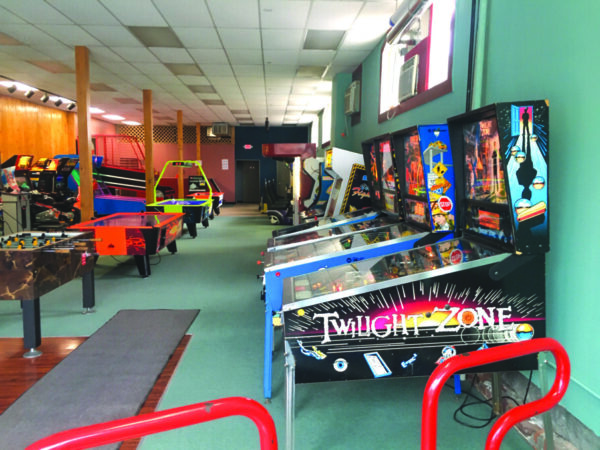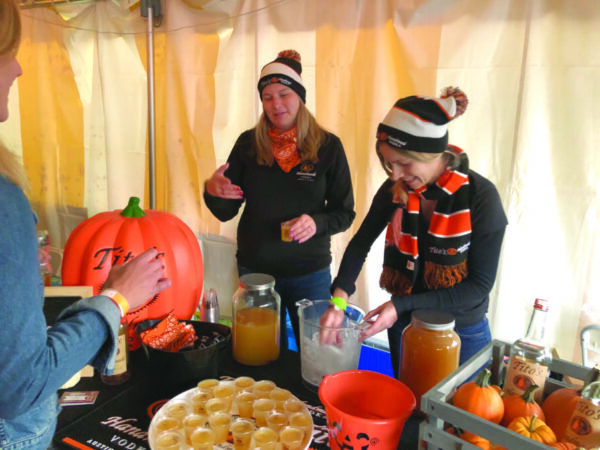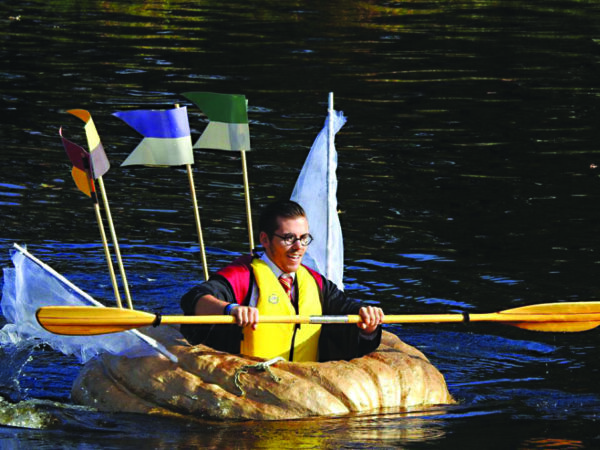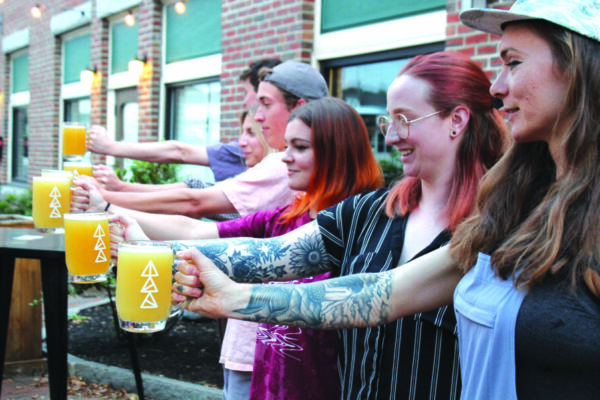Your guide to fun scares and Halloween happenings
It’s the scary season — you know, fun scary.
If worrying about the real world has you frazzled, take some time out to enjoy the intentional spookiness, the costumes, the jack-o’-lanterns and of course the candy of Halloween. Though some events are still on hold or modified for the year, a lot of the seasonal fun is back. Find events geared toward kids (including, of course, trick or treating), plus movie screenings, music and costume parties for the older crowd and haunted houses and attractions for those who dare.
More treats than tricks
Halloween events for kids and families
Compiled by Angie Sykeny
Bring the kids for some Halloween fun at these family-friendly events, where they can trick-or-treat at downtown business, do spooky (and not-so-spooky) activities at the museum, show off their costumes in a parade and more.
• There’s a Halloween Dance Party with a DJ at George B. White Basketball Court (8 Raymond Road, Deerfield) on Friday, Oct. 22, from 6:30 to 8:30 p.m., open to kids in grades 3 through 5. Prizes will be awarded for the most creative, scariest and best-overall costumes. Admission costs $5. Visit deerfield.recdesk.com.
• Join the Children’s Museum of New Hampshire (6 Washington St., Dover) for its Not So Spooky Weekend, happening Friday, Oct. 22, through Sunday, Oct. 24. There will be Halloween-themed educator-led programs and self-led drop-in activities each day. Costumes are welcome, but regular masks are still required. The Halloween festivities are included with regular admission to the museum, which costs $11 for adults and kids over age 1, and $9 for seniors. Register online in advance. Visit childrens-museum.org.
• Chunky’s Cinema Pubs (chunkys.com) has some screenings on the schedule geared at younger movie goers. On Saturday, Oct. 23, at 6:30 p.m. and Sunday, Oct. 24, at 6 p.m., the theaters in Nashua (151 Coliseum Ave.) and Manchestser (707 Huse Road) will offer an all-ages friendly screening of Harry Potter and the Sorcerer’s Stone (PG, 2001), with costumes encouraged. Tickets cost $5.99. Take the kids for a “Little” Lunch Date to see the 2019 animated movie The Addams Family (PG) at Chunky’s Cinema Pubs in Manchester, Nashua and Pelham (150 Bridge St.) on Friday, Oct. 29, at 11:30 a.m. Tickets are free but reserve a spot with a $5 food voucher.
• Paint a Halloween owl at The Canvas Roadshow (25 S. River Road, Bedford) on Saturday, Oct. 23, at 10 a.m. The cost is $25 for the step-by-step workshop and 11”x14” canvas painting. Registration is required by Aug. 21. Then, on Sunday, Oct. 31, at 1 p.m., there’s a Halloween candy charcuterie tray and pumpkin painting workshop, recommended for kids ages 5 through 10. Tickets, which include admission for one adult and two children, one charcuterie and two small pumpkins, cost $75. Register by Oct. 28. Visit thecanvasroadshow.com.
• DeMeritt Hill Farm (20 Orchard Way, Lee) presents its Storybook Halloween Hayride on Saturdays, Oct. 23 and Oct. 30, and Sundays, Oct. 24 and Oct. 31. The event is designed for elementary school-aged children, featuring storytelling with characters like Snow White, Cinderella, Superman, Belle and others along the hayride. Each child will receive Halloween goodies and a pumpkin. The hayride lasts about 30 to 45 minutes and departs every half-hour. The cost is $14 per child and $5 per adult. Reservations are recommended. Visit demeritthillfarm.com.
• The YMCA’s Trunk-or-Treat will be held at Camp Sargent (141 Camp Sargent Road, Merrimack) on Saturday, Oct. 23, from 11 a.m. to 1 p.m. The free outdoor event will feature crafts, games and snacks. Tickets must be purchased in advance. Visit bit.ly/3EtsieG for the EventBrite page.
• Derry will have its Halloween festivities on Saturday, Oct. 23, including the Spooktacular Costume Parade and Contest at Hood Park (4 Rollins St.) from 11:30 a.m. to noon, with categories for kids ages 12 and under and families; and the Downtown Trick-or-Treat from noon to 3 p.m. Visit derrynh.org.
• Hopkinton’s Halloween Holler is on Saturday, Oct. 23, at Harold Martin School (271 Main St.). A kids costume parade will take off from the parking lot at 11 a.m. and proceed down Main Street to Hopkinton Village Store, then back to the school. Following the parade there will be games, crafts, s’mores over the campfire, hot cocoa and cider and more. Admission is free. Visit hopkintonrec.com.
• The Aviation Museum of New Hampshire (27 Navigator Road, Londonderry) is issuing free “Broomstick Pilot Licenses” to kids age 12 and under on Saturday, Oct. 23, from 10 a.m. to 2 p.m. The experience lasts about 20 minutes and includes a “ground school” where the ghosts of aviation pioneers from history will talk about their achievements and teach about the basic principles of flight. Then, applicants will then have their headshots taken and receive their license, as well as some Halloween treats. The regular museum admission charge of $10 will still apply for visitors age 13 and up. Visit aviationmuseumofnh.org or call 669-4820.
• Charmingfare Farm (774 High St., Candia) continues its Children’s Trick-or-Treat experience on Saturdays, Oct. 23 and Oct. 30, and Sundays, Oct. 24 and Oct. 31. The experience includes costumed characters handing out candy in the barnyard; a tractor train or horse-drawn wagon pumpkin patch ride; a cow milking contest; pumpkin decorating; and pony rides. The cost is $22 per person and free for children under age 2. Visit visitthefarm.com to register for a timeslot.
• With its mix of candy and fear, Willy Wonka & the Chocolate Factory (G, 1971) captures the Halloween spirit. The movie will screen on Sunday, Oct. 24, at 3 p.m. at the Rex Theatre (23 Amherst St. in Manchester; 668-5588, palacetheatre.org). Tickets cost $12; a portion of the proceeds goes to the Children’s Hospital at Dartmouth.
• Milford’s Trick-or-Treat on the Oval is on Friday, Oct. 29, from 3 to 4:30 p.m. The town Recreation Department and businesses on the Oval will be handing out candy and small toys to kids in costume. Visit milfordrec.com.
• Canterbury hosts its Wicked Weekend on Friday, Oct. 29, and Saturday, Oct. 30. The Canterbury Woods Trick-or-Treat will take place on Friday from 5 to 7:30 p.m. Then, on Saturday, there’s the Sherwood Forest Trick-or-Treat from 2 to 5 p.m.; the Town Center Trick-or-Treat from 5:30 to 7:30 p.m.; and a Haunted Trail at 224 Baptist Road at 6:30 p.m. See the “Canterbury, NH” group on Facebook.
• Wear your costumes and trick-or-treat at Manchester City Hall (1 City Hall Plaza) on Friday, Oct. 29, from 3 to 5 p.m. Meet Mayor Craig, pick up a book from the library’s Bookmobile, then do some trick-or-treating at the businesses on Elm Street. Visit manchesternh.gov.
• The CHaD Storybook Tablescape Tour comes to the Bedford Event Center (379 S. River Road, Bedford) on Saturday, Oct. 30, with tours starting at 11:30 a.m. Guests will receive a red carpet welcome by costumed characters who will guide them through a storybook experience, ending with sweet treats. Tickets cost $10 per person, free for kids age 2 and under, and must be purchased in advance. Masks are required. Visit getinvolved.dartmouth-hitchcock.org.
• Come in costume and get ready to sing and dance at the Mr. Aaron Band Halloween Bash, happening at the Kimball Jenkins Estate (266 N. Main St., Concord) on Sunday, Oct. 31, with shows at 10 a.m. and noon. The outdoor shows will include some Mr. Aaron favorites as well as some Halloween songs. Bring a blanket or lawn chairs. Tickets $10. Visit mraaronmusic.com.
• Deerfield’s Tailgate Trick-or-Treat and Costume Parade returns to the Deerfield Fairgrounds (34 Stage Road) on Sunday, Oct. 31, from 1 to 2:30 p.m. Visit deerfield.recdesk.com.
• Tilton’s Downtown Trunk-or-Treat and Children’s Costume Parade will take place on Saturday, Oct. 31, from 4 to 6:30 p.m. on Main Street. There will be a costume contest, music, family activities and more. See the “Tilton Downtown Trunk or Treat 2021” event on Facebook.
• Bow’s Trunk-or-Treat will take place on Sunday, Oct. 31, from 2 to 3:30 p.m. at Bow High School (55 Falcon Way). Visit bownh.gov.
• Head to the Village Green in Amherst for the Halloween Doors trick-or-treating event on Saturday, Oct. 31. Register online in advance for a time slot between 1 and 4 p.m. Visit amherstnh.myrec.com.
Trick or Treat
When do adults need to stock up on mini Snickers and Reese’s (or full-size bars, if you want to be a hero) so costumed kids can hit the streets to look for candy? According to town websites, social media pages and/or town officials, the following are the scheduled trick-or-treat times. In case of the odd Halloween snow storm or other strange weather, check with your town on the day to make sure trick-or-treat is still on.
Saturday, Oct. 30
Barrington: 5 to 7 p.m.
Boscawen: 5 to 8 p.m. (The Boscawen Police Dept. is slated to hold a Trunk or Treat event from 5 to 8 p.m. at Boscawen Elementary School.)
Canterbury: Canterbury does a trunk-or-treat/Halloween celebration in the Town Center from 5:30 to 7:30 p.m., according to the police department.
Dover: 5 to 8 p.m.
Durham: 5 to 7:30 p.m.
Greenland: 5 to 7 p.m.
Hampton Falls: 5 to 7 p.m.
New Castle: 5 to 7 p.m.
Newmarket: 5 to 7 p.m.
North Hampton: 4 to 7 p.m.
Portsmouth: 3 to 6 p.m. (The police department is giving away free bright yellow Halloween bags to Portsmouth residents.)
Rollinsford: 5 to 7 p.m.
Seabrook: 5:30 to 7:30 p.m.
Strafford: 5 to 8 p.m.
Stratham: 5 to 7:30 p.m.
Tilton: 6:30 to 8 p.m. (The Trunk or Treat and children’s costume parade will run from 4 to 6:30 p.m.)
Sunday, Oct. 31
Allenstown: 5 to 7 p.m.
Amherst: 6 to 8 p.m. (Halloween Doors on the Green will also offer trick-or-treating from 1 to 4 p.m.; register for a specific time slot at amherstnh.myrec.com.)
Antrim: 5:30 to 7:30 p.m.
Atkinson: 5:30 to 7:30 p.m.
Auburn: 1 to 4 p.m.
Bedford: 6 to 8 p.m.
Belmont: 4 to 8 p.m.
Bennington: 5:30 to 7:30 p.m.
Bow: 5 to 8 p.m. (Bow Parks & Recreation will hold Trunk or Treat at Bow High School from 2 to 3:30 p.m.)
Bradford: 5 to 8 p.m. (Main Street will be closed during this time.)
Brentwood: 6 to 8 p.m.
Brookline: 6 to 8 p.m.
Candia: 5 to 8 p.m.
Chichester: (The PTO is holding a trunk-or-treat event on Sunday, Oct. 24, from 4 to 6 p.m. at Carpenter Park.)
Concord: 5 to 7:30 p.m.
Danville: 6 to 8 p.m. (The Danville Police Department is handing out free glow bracelets to anyone who plans to trick-or-treat. The Recreation Department will host a trunk-or-treat at the Community Center from 11 a.m. to 2 p.m.)
Deerfield: 4 to 7 p.m. (The Parks & Rec department is holding a tailgate trick-or-treat and costume parade for town residents at the Deerfield Fairgrounds from 1 to 2:30 p.m. with parking beginning at noon. See deerfield.recdesk.com for ticket info.)
Deering: 5 to 8 p.m.
Derry: 6 to 7:30 p.m.
Dunbarton: 4 to 7 p.m.
Epping: 5 to 7 p.m.
Epsom: 4 to 8 p.m.
Exeter: 4 to 7 p.m.
Francestown: (Main Street trick-or-treating and Horse Sheds Trunk or Treat will run from 6 to 7:30 p.m.)
Franklin: 4 to 7 p.m.
Goffstown: 6 to 8 p.m.
Hampstead: 6 to 8 p.m.
Hampton: 5:30 to 8 p.m.
Henniker: 5:30 to 7:30 p.m.
Hillsborough: 5 to 8 p.m.
Hollis: 6 to 8 p.m.
Hooksett: 6 to 8 p.m.
Hudson: 6 to 8 p.m.
Kingston: 5 to 8 p.m.
Laconia: 5 to 8 p.m. (Laconia Parks & Rec will host trick-or-treating in Opechee Park from 5 to 8 p.m.)
Lee: 5 to 7 p.m. (Lee’s Fireman’s Association will hold drive-thru Trunk or Treat at the Lee Safety Complex Oct. 31 from 5 to 7 p.m.)
Litchfield: 6 to 8 p.m.
Londonderry: 5 to 7:30 p.m. (Starting Oct. 27, trick-or-treaters can pick up a glow necklace at the police department lobby.
Lyndeborough: 6 to 8 p.m.
Manchester: 6 to 8 p.m. (Halloween at City Hall/Downtown Trick or Treat is scheduled for Friday, Oct. 29, from 3 to 5 p.m. Visit City Hall Plaza for a free book and then participating downtown businesses for treats.)
Milford: 6 to 8 p.m.
Mont Vernon: 5 to 8 p.m. (Trick or Treat in the Village will run from 6 to 8 p.m.)
Merrimack: 6 to 8 p.m.
Nashua: 6 to 8 p.m.
New Boston: 6 to 8 p.m. (A trunk-or-treat event will start at 5:30 p.m. at New Boston Town Hall.)
New Ipswich: 5 to 7 p.m.
New London: 4 to 6 p.m.
Northfield: 5 to 8 p.m.
Nottingham: 5 to 7 p.m.
Pelham: 5 to 8 p.m.
Pembroke: 5 to 8 p.m.
Pittsfield: 5 to 7 p.m.
Plaistow: 5 to 7 p.m.
Raymond: 5 to 7 p.m.
Salisbury: 5 to 8 p.m.
Sanbornton: 4 to 7 p.m. (Trunk or Treat will be held from 2 to 4 p.m. at Sanbornton Central School.)
Sandown: 6 to 8 p.m.
Warner: 5 to 8 p.m.
Washington: 5 to 8 p.m. at the town commons
Weare: 5:30 to 7:30 p.m.
Wilton: 6 to 8 p.m.
Windham: 5 to 8 p.m.
Enter if you dare
Haunted houses, barns and dark woods to explore
By Matt Ingersoll
Chad Zingales remembers his brother and father presenting “The Haunted Barn,” a Halloween-themed attraction that was attached to his childhood colonial home in Hollis.
“That’s what kind of started my love for it all,” he said. “I’m a very right-brained individual, so I’ve always enjoyed the entertainment side of Halloween and entertaining people.”
For 14 years Zingales ran The Dark Crop over several weeks in October, a “haunted” corn maze at Lavoie’s Farm featuring a cast of scary costumed characters. Now he has a new annual haunt — The Dark Woods, a dimly lit trail behind the farm stand at Trombly Gardens in Milford.
The self-guided tour is decked out with all kinds of unique sets as you make your way through. Costumed characters, each with their own names, voices and props, will be lurking in the shadows, and you’ll never know what types of people you’ll be meeting. For Zingales it’s that theatrical aspect of Halloween attractions that makes putting them on so much fun. Actors — he fondly refers to them as “creeps” — aim for at least two to four scares per group.
“You could build this beautiful haunted house, but if you don’t have any good actors it’s a hard sell,” he said. “We’ve taught our actors how to be creepy and how to scare people, and that timing is everything. … We also strive to have everybody have a backstory. There’s a reason why this character is out in the woods, and why you encounter this particular person.”

Haunted houses have also been a lifelong love for Tim Dunne, owner of Fright Kingdom in Nashua. Now in its 17th year of serving up scares, Fright Kingdom features five uniquely themed attractions for each visitor to go through. He described “Apocalypse Z,” for example, as a scenario straight out of The Walking Dead, while “Bloodmare Manor” is inspired by an old 19th-century Victorian mansion, with family mysteries and secrets to discover.
“It’s definitely an immersive experience. We try to start scaring people as soon as they get into the parking lot,” Dunne said. “The people on our team could be bagging your groceries or handling your finances. … The one thing they all have in common is that they love Halloween.”
Each year Dunne and his team try to think of new ways to scare people, through the inclusion of new rooms or hallways, soundtracks, or costumes or makeup artistry. Fright Kingdom is also unique because the haunts don’t stop after Halloween is over.
“We do a Krampus-themed event during Christmas, and then we do a catered dinner inside the haunted house for Valentine’s Day that always sells out,” Dunne said.
You’ll also encounter spooky sets and costumed characters at The Salisbury Woods, a haunted barn and trail staffed entirely by volunteers on the Salisbury property of Brett Walker.
“On a normal night we can have anywhere from 60 to 70 actors out there in various spots, and there are quite a few animatronics out there as well,” Walker said. “The animatronics kind of act as a distraction for the actors to come out and get another good scare.”
The Salisbury Woods first launched eight years ago as a short walk through the barn. But over the years, Walker said, more and more sets have been added. The production is a fundraiser for several Salisbury-area organizations, like the town’s parent-teacher group and the Fire Explorers.
In Litchfield, Spooky World Presents Nightmare New England is celebrating its 30th year in business. It’s been at Mel’s Funway Park for just over a decade, according to co-owner Mike Accomando, but originally opened in Berlin, Mass., back in 1991.
“It’s a massive show that you can spend the entire night coming out to enjoy,” he said. “We tell people to definitely plan on staying for at least a couple of hours.”
Like at Fright Kingdom, new features are always being added to Spooky World’s repertoire. A haunted hayride spanning more than 80 acres of the property was introduced a few years ago. New to this year’s Spooky World experience is a haunt called “Asylum 47.”
“It’s an entirely new medical scene that we’ve designed,” Accomando said. “As you’re leaving one room and going into another, everything is changing, from the sounds to the lights to the smells, and so everything is constantly working in your head. … We’re also constantly changing scare zones, so you may know what’s going to happen if you were there before but we make sure it’s something different that you see each time you’re there.”
A host of haunts
There are plenty of opportunities for a frightful Halloween in New Hampshire this year. Check out this list of local haunted houses, barns and outdoor trails through the woods.
The Dark Woods at Trombly Gardens
150 N. River Road, Milford, 465-DARK (3275), thedarkwoodsnh.com
Hours: Fridays and Saturdays, Oct. 22 and 23, and Oct. 29 and 30, and Sunday, Oct. 31; gate opens at 7 p.m., with the last ticket sold at 10:30 p.m.
Cost: $21 general admission; advance ticket purchasing online is encouraged
During this self-guided tour through the woods behind the farm stand at Trombly Gardens in Milford, you’ll find a cast of creepy characters and misfits, each with their own props, stories and reasons for being there.
Fright Kingdom
12 Simon St., Nashua, 809-1173, frightkingdom.com
Hours: Fridays and Saturdays, 7 to 11 p.m., and Sundays, 7 to 10 p.m., now through Nov. 6 (haunts close after the last ticket holder goes through)
Cost: $29 general admission; purchase advance tickets online
Now in its 17th year of serving up scares, Fright Kingdom features five haunted house attractions, each with their own unique themes, from “Psycho Circus” to “Bloodmare Manor.” Special “In the Dark” experiences are set for Friday, Nov. 5, and Saturday, Nov. 6, when attendees will be given a single light source per group as they attempt to navigate their way out.
Haunted Overload
DeMerritt Hill Farm, 20 Orchard Way, Lee, 868-2111, hauntedoverload.com
Hours: Thursdays, Fridays, Saturdays and Sundays, now through Oct. 31, beginning at 7 p.m. and ending at 8:30 or 9:30 p.m., depending on the night. Day walks are also available on Fridays, Saturdays and Sundays, between 10 a.m. and 4 p.m.
Cost: Main event admission is $28 and day walk admission is $8. Other rates apply for special themed events, including a Fright Night Lite on Thursday, Oct. 28 ($14.50 per person; no scares), a Glow Stick Night on Saturday, Oct. 30 ($18 per person), and a Black Out Night on Sunday, Oct. 31 ($17 per person). All tickets must be purchased in advance.
Located on DeMerritt Hill Farm in Lee, Haunted Overload has multiple types of shows to choose from. Its main event features a full cast of actors, complete with theatrical lighting and special events, as attendees traverse through a spooky wooded trail. You can also enjoy the lighting and effects without the scares during Fright Night Lite, or visit the trails and see the props during any of the day haunts.
The Salisbury Woods
19 Franklin Road, Salisbury, 496-2334, facebook.com/thesalisburywoods
Hours: Fridays and Saturdays, Oct. 22 and 23, and Oct. 29 and 30; 7 to 10 p.m. each night
Cost: $10 admission; advance ticketing online is strongly recommended (choose your own timed ticket slots), but cash tickets will be sold at the gate if they are available.
The Salisbury Woods is a haunted barn and trail, staffed entirely by volunteers and featuring dozens of costumed actors and animatronic setups. It’s also a fundraiser for several local organizations, including the Salisbury Parent Teacher Group and the Salisbury Fire Explorers.
Screeemfest
Canobie Lake Park, 85 N. Policy St., Salem, 893-3506, canobie.com/screeemfest
Hours: Fridays, Saturdays and Sundays, now through Oct. 30; hours are 6 to 11 p.m. on Fridays, 3 to 11 p.m. on Saturdays and 1 to 8 p.m. on Sundays
Cost: General admission rates are $46 on Fridays and Sundays, and $55 on Saturdays. Admission is $32 all three days for kids under 48 inches tall and seniors over 60, and free for kids ages 3 and under. Group rates are also available. Advance reservations are required.
For six weeks, Canobie Lake Park transforms into Screeemfest, a Halloween-themed destination featuring five themed haunted houses, plus a full schedule of live shows, games, rides and more. Indoor haunts open at 6 p.m. on Fridays and 5 p.m. on Saturdays and Sundays, while outdoor haunts open as soon as it gets dark (typically around 6:45 p.m.).
Spooky World Presents Nightmare New England
Mel’s Funway Park, 454 Charles Bancroft Hwy., Litchfield, 424-7999, spookyworld.com
Hours: Regular season now runs Thursdays, Fridays, Saturdays and Sundays, through Oct. 31. Shows begin at 7 p.m. each night and end around 9:35 p.m. on Thursdays and Sundays, and 11:05 p.m. on Fridays and Saturdays. Two special events will close out the season, including a TikTok Meet & Greet on Friday, Nov. 5, and a Lights Out event on Saturday, Nov. 6.
Cost: Rates vary; general admission starts at $41.49 on Thursdays and Sundays, $46.49 on Fridays and $51.49 on Saturdays. VIP rates are also available (varies before or after 9:30 p.m.)
Spooky World is celebrating its 30th anniversary in business this year — the haunted attraction originated in Berlin, Mass., in 1991 before briefly moving to Gillette Stadium in Foxborough, eventually landing at its current spot at Mel’s Funway Park in 2009 when it joined forces with Nightmare New England. In 2015, Spooky World added a 1-mile-long haunted hayride, and it has a new attraction for 2021 called “Asylum 47.”
Haunted happenings
All-ages Halloween fun
Compiled by Angie Sykeny
From costume contests to hikes and parades, these all-ages Halloween events have something for everyone.
• Join the NH Audubon (84 Silk Farm Road, Concord) for an Enchanted Forest experience on Friday, Oct. 22, or Saturday, Oct. 23, with tours offered between 5 and 7:45 p.m. Follow a forest trail, illuminated by jack-o-lanterns, and encounter creatures, plants and characters along the way, who will perform skits. The walk ends with a storytime at a campfire. This family-friendly experience is open to kids ages 4 and up and adults. The cost is $15 per person, and pre-registration is required. Visit nhaudubon.org.
• The Haunting of Wilton will take place on Saturday, Oct. 23, with downtown merchants trick-or-treating from 2 to 4 p.m., a costume parade down Main Street at 4:30 p.m., and a costume dance in the park with a DJ from 6 to 9 p.m. Visit visitwilton.com.
• Deerfield hosts its 5th annual Haunted Stables on Saturday, Oct. 23, from 7 to 9 p.m. at the Deerfield Fairgrounds (34 Stage Road). Residents of Deerfield and surrounding towns are invited for a night of spooky fun and tasty refreshments. Visit facebook.com/deerfieldpolicenh.
• Intown Concord’s Halloween Howl returns to Main Street in the Capital City on Friday, Oct. 29, from 5:30 to 7:30 p.m. Come in costume and enjoy trick-or-treating, Halloween decor, and games and activities for all ages in downtown. Admission is free. Visit intownconcord.org.
• There’s an all-ages Zombie Walk in Dover on Saturday, Oct. 30. The walk starts at 2 p.m. at the Dover Chamber of Commerce parking lot (550 Central Ave.) and will proceed down Central Avenue, ending at Rotary Arts Pavilion. Participants will receive goodie bags and raffle tickets to win gift cards for downtown Dover businesses and other prizes. Non-zombie costumes are also welcome. Visit dovermainstreet.org.
• Deering’s Trunk-or-Treat will be held on Saturday, Oct. 30, from 5 to 7 p.m. at Deering Fish and Game (Fish and Game Road). In addition to the trunk-or-treat, there will be games, hay rides, a campfire, snacks and a jack-o’-lantern contest (bring your own, pre-carved). The event is BYOB for adults. Visit deering.nh.us.
• Meet at Keach Park in Concord for an all-ages Halloween Hike on Saturday, Oct. 30, starting at 1 p.m. There will be games, songs, books, crafts and more. Costumes are welcome. Visit concordnh.gov.
• Merrimack will have its 29th annual Halloween Party, Sparkly Spooktacular, on Saturday, Oct. 30, from 2 to 7 p.m. at Wasserman Park (116 Naticook Road). Festivities will include free games, crafts, entertainment and food vendors from 2 to 5 p.m.; a concert by the Whiskey Business Band from 5 to 6:30 p.m.; and fireworks at 6:30 p.m. Visit merrimackparksandrec.org/halloween-party.
• Allenstown’s Townwide Halloween Lighting Contest is going on now, with winners to be announced at an awards ceremony at Blueberry Express Park (16 School St.) on Saturday, Oct. 30, at 4 p.m. First-, second- and third-place prizes will be awarded for the houses with the best Halloween decorations. Visit allenstownnh.gov for a list of participating residences.
• The Exeter Halloween Parade and Costume Contest will be held on Saturday, Oct. 30, with the parade starting at 10:30 a.m. at the Water Street end of Swasey Parkway and proceeding to the center pavilion, where there will be refreshments and awards for the best costumes. Additionally the Downtown Trick-or-Treat will be going on from 11:30 a.m. to 2:30 p.m. Visit exeternh.gov.
• Head to the Brown Lane Barn at Beaver Brook Nature Center (52 Brown Lane, Hollis) for a Halloween Enchanted Forest Walk on Saturday, Oct. 30, with time slots from 3 to 5 p.m. The non-scary self-guided walk will include educational stations along the way where participants can learn about New England wildlife, and will end at a campsite with cider and s’mores over a campfire. The cost is $12 per person. Visit beaverbrook.org.
• Head to the JFK Coliseum (303 Beech St., Manchester) for a Halloween Skate Party on Saturday, Oct. 30, from 2 to 4 p.m. Enjoy ice skating, a costume contest and a photo booth. Wear your costume and get a goodie bag at the door. Tickets cost $5 for adults and $3 for children and seniors (cash only). Skate rentals will be available for $5. Visit manchesternh.gov.
• The Amherst Orthodontics Trick or Trot 3k takes place on Sunday, Oct. 31, at 11 a.m., in Arms Park (10 Arms St., Manchester). The course goes up to the Notre Dame Bridge, crosses the bridge, then returns back across the bridge to Arms Park. The Stonyfield Lil’ Pumpkin Fun Runs for kids age 8 and under will proceed the race at 10 a.m. Registration costs $25 for adults age 21 and older, $20 for youth ages 12 through 20 and $15 for kids ages 9 through 11 for the 3k, and $10 for the Lil’ Pumpkin Runs. The registration deadline is Oct. 29, at 9 a.m., and race-day registration will not be available. Visit millenniumrunning.com/trick-or-trot.
• Don’t miss the Portsmouth Halloween Parade on Sunday, Oct. 31. All are welcome to come in costume and march in the parade; meet at Peirce Island by Prescott Park at 6 p.m. No sign-up is required. The parade will begin at 7 p.m. and march through downtown. Visit portsmouthhalloweenparade.org.
• Head to McIntyre Ski Area (50 Chalet Way, Manchester) for its Witch of Weston Tower experience, happening every weekend in October on Fridays, from 4 to 8 p.m., Saturdays from noon to 8 p.m., and Sundays from noon to 6 p.m. (last ride is at 30 minutes before closing). The experience includes transportation up the mountain and a hayride to the tower, where participants can meet the witch, play games and more. The cost is $15 for kids and adults age 9 and up, and free for kids under age 9. Visit manchesternh.gov.
• The Harvest Festival at Applecrest Farm (133 Exeter Road, Hampton Falls) is going on every Saturday and Sunday in October, from 11 a.m. to 5 p.m., with pick-your-own opportunities, a corn maze, live music, tractor rides, barnyard animals and more. Admission is free. Stop by on Sunday, Oct. 24, to see the Great Pumpkin Carve, where a master carver will take on an 800-pound jack-o-lantern. Visit applecrest.com.
• The corn maze at Coppal House Farm (118 N. River Road, Lee) is open through October. Farm hours are Monday, Thursday and Friday, from noon to 5 p.m., and Saturday and Sunday, from 10 a.m. to 5 p.m., with the last admission at 4:30 p.m. The cost is $9 per person; $7 for kids ages 5 through 12, seniors age 65 and up, and military; and free for kids age 4 and under. A flashlight night maze will be open on Saturday, Oct. 23, from 6:30 to 9 p.m., (BYO flashlight), with tickets priced at $12 per person, ages 5 and up. Tickets for the flashlight maze must be purchased online in advance. Visit nhcornmaze.com.
Also check out the corn maze at Riverview Farm (141 River Road, Plainfield), open through October, Tuesday through Sunday, from 10 a.m. to 5:30 p.m. The cost is $5 per person and free for kids age 4 and under. Visit riverviewnh.com.
• O’neil Cinemas at Brickyard Square (24 Calef Hwy. in Epping; 679-3529, oneilcinemas.com) continues its Film Frenzy $5 series of classic films with some Halloween appropriate titles: The Shining (R, 1980) which screens through Thursday, Oct. 21; Beetlejuice (PG, 1988) which screens Monday, Oct. 25, through Thursday, Oct. 28, and A Nightmare on Elm Street (R, 1984), Monday, Nov. 1, through Thursday, Nov. 4. The films are screened multiple times each day.
• Jeff Rapsis will present The Phantom of the Opera (1925), the silent film starring Lon Chaney, with live musical accompaniment on Thursday, Oct. 21, at 6:30 p.m. at the Flying Monkey (39 Main St. in Plymouth; 536-2551, flyingmonkeynh.com). Tickets start at $10. He will also perform live music to accompany the film on Wednesday, Oct. 27, at Park Theatre at 7 p.m. (19 Main St. in Jaffrey; theparktheatre.org). Admission costs $12 per person and tickets are available online or at the door.

• The Rex Theatre (23 Amherst St. in Manchester; 668-5588, palacetheatre.org) will offer a classic 1980s horror film and a classic silent era horror. On Thursday, Oct. 21, at 7 p.m., see A Nightmare on Elm Street (R, 1984). Tickets cost $10 ($8 with student ID). On Thursday, Oct. 28, see Nosferatu (1922), the silent film directed by F.W. Murnau, at 7:30 p.m. The presentation features live musical accompaniment by Jeff Rapsis. Admission costs $10.
• Red River Theatres (11 S. Main St. in Concord; 224-4600, redrivertheatres.org) continues its series of horror films screened on Thursdays in October at 7 p.m. On Oct. 21, catch 1972’s Frenzy and on Oct. 28, see 1982’s The Thing.
• Chunky’s Cinema Pub in Manchester (707 Huse Road), Nashua (151 Coliseum Ave.) and Pelham (150 Bridge St.) will screen Psycho (1960), starring Anthony Perkins and Janet Leigh) on Friday, Oct. 29, at noon, as part of a senior showing. Admission is free; secure a seat by purchasing a $5 food voucher at chunkys.com
Boootiful music
Costume parties & more for the grown-up Halloween fan
Compiled by Amy Diaz
For the older crowd, several area breweries, restaurants and other venues have parties, often with costume contests planned this Halloween season. Because the holiday itself falls on a Sunday, some parties are happening Saturday or even earlier in the week, giving you more opportunities to dress up and head out. (Note: Some events are 21+. Information here comes from the venues’ websites and social media.) Know of a party not listed here? Let us know at [email protected].
In the days before Halloween…
• Jewel Music Venue (61 Canal St. in Manchester; 819-9336) will host a Pop Punk Halloween on Thursday, Oct. 21, at 6:30 p.m. featuring Big Smile, Driveways, Rematch, Promise Game, 20 Something and Day Trip. Tickets cost $12 in advance, $15 at the door, for this 18+ event.
• Twin Barns Brewing (194 Daniel Webster Hwy. in Meredith; 279-0876) will host a pumpkin painting party on Friday, Oct. 22, at 5 p.m.
• Averill House Winery (21 Averill Road in Brookline; 371-2296, averillhousevineyard.com) will hold a Spooktacular Halloween Comedy Show with headliner Mike Koutrobis on Saturday, Oct. 23, from 7 to 8 p.m. Doors open at 6:30 p.m. Costumes are encouraged. Tickets cost $15 in advance.
• Head back to Jewel Music Venue (61 Canal St. in Manchester; 819-9336) on Saturday, Oct. 23, at 7 p.m. for the Halloween Bash featuring tribute sets with bands performing the music of Slipknot, Deftones, Vanna and Hawthorne Heights, free candy, a costume contest with prizes and more. Tickets cost $12 in advance, $20 the day of (or $15 day of with a costume) to this 18+ show.
• Monique Toosoon will co-host a Halloween-themed “Life’s a Drag” show at Chunky’s Cinema Pub in Manchester (707 Huse Road) on Saturday, Oct. 23 at 9 p.m. (doors open at 8 p.m.). Tickets cost $25 and are available at chunkys.com. “The shows are high energy, funny, diverse and interactive. Performers dance, lip-sync and some even sing live,” Monique said in an email.
• Copper Door restaurants in Bedford (15 Leavy Dr.; 488-2677, copperdoor.com) and Salem (41 S. Broadway; 458-2033) will hold Wicked Scary Week Oct. 24 through Oct. 31, with special lunch and dinner menus, drinks, games and live music on Oct. 24 (11 a.m. to 2 p.m.), Oct. 28 (7 to 10 p.m.) and Oct. 31 (11 a.m. to 2 p.m.).
• Sea Dog Brewing Co. (5 Water St. in Exeter; 793-5116, seadogbrewing.com) will hold a Mug Club Social Halloween Bash on Monday, Oct. 25, from 5 to 8 p.m. RSVP and find out more about joining the brewery’s Mug Club at [email protected]. The night will feature live music, food, raffles and more.
• Last in Linewill play The Big House (322 Lakeside Ave. in Laconia; bighousenightclub.com) on Friday, Oct. 29, at 6 p.m. for a Halloween Party, costumes encouraged. Tickets cost $25 in advance, $30 at the door.
• Chop Shop Pub (920 Lafayette Road in Seabrook; 760-7706, chopshoppub.com) will hold a Halloween Extravaganza Costume Party with music by FastTimes (playing 1980s music) on Friday, Oct. 29, at 6:30 p.m.
• Chunky’s Cinema Pub in Pelham (150 Bridge St.; chunkys.com) will hold a live, 21+ Ghouling Pianos Halloween Bash on Friday, Oct. 29, at 8:30 p.m. featuring the Dueling Pianos. Costumes are encouraged; tickets cost $20.
• Wally’s Pub (144 Ashworth Ave. in Hampton; 926-2801) will host Prospect Hill’s 12th annual Halloween Bash, featuring special guests Lansdowne, Sleepspirit and Psycle, on Friday, Oct. 29, starting at 7:30 p.m. Tickets for this 21+ event cost $20.
• Lynn’s 102 Tavern (76 Derry Road in Hudson; 943-7832, lynns102.com) will hold a karaoke costume party on Friday, Oct. 29, starting at 8 p.m. with gift certificates for the best costume.
Saturday, Oct. 30
• Millyard Brewery (25 E. Otterson St. in Nashua; 722-0104, millyardbrewery.com) will host Bradley Copper Kettle and Friends at 3 p.m.
• Chunky’s Cinema Pub in Nashua (151 Coliseum Ave.) and Manchester (707 Huse Road; chunkys.com) will hold a live, 21+ Ghouling Pianos Halloween Bash on Saturday, Oct. 30, at 8:30 p.m. featuring the Dueling Pianos. Costumes are encouraged; tickets cost $20.
• Cercle National Club (550 Rockland Ave. in Manchester; 623-8243) will start its Halloween party at 5 p.m. with Off Duty Angels.
• The Polish American Club (15 School St. in Nashua; 821-7535) will hold a karaoke Halloween Party starting at 6 p.m., with prizes for best costumes, food and more.
• Shane’s BBQ (61 High St. in Hampton; 601-7091, shanes-texas-pit.com) will hold a costume contest starting at 6 p.m, with prizes for first and second place.
• Head back to Chop Shop Pub (920 Lafayette Road in Seabrook; 760-7706, chopshoppub.com) at 6:30 p.m. for a second night of celebrations with Halloween Bash with a costume party with prizes and bands including Notley Crue (a Motley Crue tribute band), Band Inc. and Casual Gravity.
• Area 23 (254 N. State St. in Concord; 881-9060, thearea23.com) will hold a Halloween party with a costume contest and the band Holy Fool from 7 to 11:47 p.m.
• The Purple Pit Coffee Lounge (28 Central Sq. in Bristol; 744-7800, thepurplepit.com) will feature The Krimson Krewe from 7 to 9 p.m., with a Mardi Gras costume contest. Doors open at 6 p.m.; admission costs $15 per person.
• High Octane Saloon (1072 Watson Road in Laconia; 527-8116, highoctane603.com) will kick off its Halloween party at 7 p.m. with music by EXP Band, a costume party with prizes and an entry fee of $5.
• Long Blue Cat Brewing Co. (298 Rockingham Road in Londonderry; 818-8068, longbluecat.com) will hold a Halloween party at 7 p.m., with costumes encouraged (and prizes for the best costumes) and beer and drink specials and a DJ and dancing.
• Boston Billiards Club & Casino (55 Northeastern Blvd. In Nashua; 943-5630, bostonbilliardclubcasino.com) will hold its annual Halloween Bash starting at 8 p.m. featuring the band Plan B and a costume party with prizes.
• The Gas Light (64 Market St. in Portsmouth; 430-9122, portsmouthgaslight.com) will host Nightmare on Market Street Halloween Party, which starts at 8 p.m. with a DJ, dancing, drink specials, costume contest with prizes and more. Tickets in advance cost $12 (plus fees) for general admission and $30 (plus fees) for VIP tickets.
• Head back to Lynn’s 102 Tavern (76 Derry Road in Hudson; 943-7832, lynns102.com) today for a Halloween Bash at 8 p.m. featuring Sindicate and a cash prize for best costume.
• The Peddler’s Daughter (48 Main St. in Nashua; 821-7535, thepeddlersdaughter.com) will kick off its party at 8 p.m. Check with social media closer to the date for updates.
• Saddle Up Saloon (92 Route 125 in Kingston; 369-6962, saddleupsaloonnh.com) will hold its Halloween party starting at 8 p.m. with Bite the Bullet, drink specials, giveaways and a costume contest.
• Tower Hill Tavern (264 Lakeside Ave. in Laconia; 366-9100, towerhilltavern.com) will hold a karaoke costume party with DJ Tim starting at 8 p.m.
• The Big House (322 Lakeside Ave. in Laconia; bighousenightclub.com) will hold a costume party featuring DJ Kadence starting at 9 p.m. with a $5 entry fee and a costume contest featuring prizes.
Halloween, Oct. 31
• The Big House (322 Lakeside Ave. in Laconia; bighousenightclub.com) will host the Weirs Drag Brunch on Halloween morning starting at 9:30 a.m. Tickets cost $25.
• Smuttynose Brewing (105 Towle Farm Road in Hampton; smuttynose.com, 436-4026) will hold a Mutt-ster Mash from 1 to 4 p.m. The afternoon will include a dog costume contest with prize, treats for humans and pups and Smuttynose Beer, with proceeds to go to Pope Memorial Humane Society.
• The Village Trestle (25 Main St. in Goffstown; 497-8230, villagetrestle.com) will hold a Halloween Party, costumes encouraged, featuring music from Bob Pratte and Steve Roberge on sax and harp starting at 3:30 p.m.
• The Alamo Texas Barbecue & Tequila Bar (99 Route 13 in Brookline; alamobarbecue.com, 721-5000) will celebrate its three-year anniversary and Halloween with live music starting at 4:30 p.m. by Ralph Allen, raffles and giveaways and more.
• Fody’s Tavern (9 Clinton St. in Nashua; 577-9015, fodystavern.com) will have a Halloween party featuring DJ Mark Allen starting at 8 p.m.
And beyond…
• On Saturday, Nov. 6, Liquid Therapy (14 Court St. in Nashua; 402-9391, liquidtherapynh.com) will hold a Halloween Trivia ExtravaganzaSaturday, Nov. 6, from 1 to 4 p.m.
Featured photo: Courtesy photo.
















